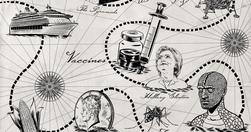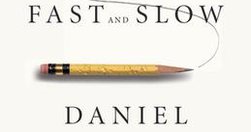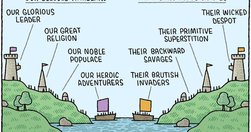Relevant Overviews
- Communication Strategy
- Content Strategy
- Online Strategy
- Online Community Management
- Social Media Strategy
- Content Creation & Marketing
- Online Architecture
- Digital Transformation
- Change & Project Management
- Personal Productivity
- Innovation Strategy
- Communications Tactics
- Psychology
- Social Web
- Media
- Politics
- Communications Strategy
- Science&Technology
- Business

what product designers do to your mind. They play your psychological vulnerabilities (consciously and unconsciously) against you in the race to grab your attention. I want to show you how they do it.... The “most empowering” menu is different than the menu that has the most choices... When we wake up in the morning and turn our phone over to see a…

Instead of trying to bludgeon online companies to conform to some opaque standard of objectivity, we need to shift towards more fruitful endeavors... none of the outlets mentioned by name... are particularly well known news institutions... the underlying bias might not be based on institutional outlook, but an internal pressure to cite sources wit…
Great explainer video - accompanying article here.

The American media, over the past year, has been trying to work out something of a mystery: Why is the Republican electorate supporting a far-right, orange-toned populist with no real political experience, who espouses extreme and often bizarre views? ... his support seems to cross demographic lines ... does surprisingly well from the Gulf Coast o…

“In 40 years,” Morton added, “as many people will believe a bunch of Arabs knocked down the World Trade Center as will believe that Lee Harvey Oswald acted alone.”

the first crux of Harcourt’s argument: The expository society exploits, rather than represses, our desires. The second ... government and commercial surveillance infrastructures have wholly merged.... Harcourt’s analysis hinges on desire: We want to participate, we are impelled to do so, and we like it. But it seems to me we are as much compelled …

When you put your life online, people think they know 80% of who you are. But internet personas are really only 20% true.... “It seemed like you were using personal experiences to gain approval from ‘the internet’ ... I wondered why the approval of your friends and family wasn’t enough. It felt like a distorted version of you"
In which I studiously avoid curating anything about 2016 or David Bowie.

Thinking, Fast and Slow is a best-selling[1] 2011 book by Nobel Memorial Prize in Economics winner Daniel Kahnema...: his early days working on cognitive biases, his work on prospect theory, and his later work on happiness.The book's central thesis is a dichotomy between two modes of thought: "System 1" is fast, instinctive and emotional; "System …

Social media platforms are built with all the insidious effectiveness of gambling machines, but it is possible to come out in front.

the idea that everyone is like us is called the “false-consensus bias.”... Online it means we can be blindsided by the opinions of our friends or, more broadly, America... morphs into a subconscious belief that we and our friends are the sane ones and that there’s a crazy “Other Side” ... that just doesn’t “get it,” ... not as intelligent as “us.”…

There is no public measure of your ego on Snapchat. No “54 likes” 13469 followers or “423 comments”. When your reader sees your post it doesn’t tell him or her the size of your ego.It’s a huge difference with LinkedIn, Facebook or Twitter. Those three keep reminding you how important the person you’re reading is ... the Snapchat user doesn’t care …

people today are inundated with more bullshit now than ever before... We presented approximately 800 participants across four studies with statements ranging from the mundane to the meaningful. We included some bullshit too... People who were more religious, more likely to believe in the paranormal, and more accepting of alternative medicine were…

Being surrounded with ready-made solutions to problems can inhibit our creative growth... Given a problem with scarce resources, the human mind will twist and mull until it has a solution. This creativity is probably our species most important feature.

Over 40 new resources ... some great longreads to enjoy as the nights grow long, the productivity tips you’ll need to find the time to read them, and a free set of steak knives. The Christmas season, after all, is almost upon us.

The brain’s craving for novelty, constant stimulation and immediate gratification creates a “compulsion loop”... we need more and more to get the same effect. Endless access to new information also easily overloads our working memory. When we reach cognitive overload, our ability to transfer learning to long-term memory significantly deteriorates.…

Making ‘a net positive contribution to people’s lives’ doesn’t necessarily satisfy investors... it’s possible to imagine regulation that actually expands users’ choices. It doesn’t need to be especially invasive or dramatic, and it would be designed to give users more control over their experiences online... Here are three things we could do…

showing people what’s going on is much more important than being present in that moment ... What you fail to understand, what you’ve never thought about understanding is why you do it... Every stupid video is a waste of 3 minutes you’ll never get back, and every picture is there to show the 1% of your life where you can smile for the camera…

I’ve been thinking about the kinds of mistakes we make when pursuing happiness. I’ve been wondering whether the biggest mistake might be seeing happiness as something we should be aiming for at all. - Everything you think you know about happiness is wrong - Quartz

In some jobs, being in touch with emotions is essential. In others, it seems to be a detriment. And like any skill, being able to read people can be used for good or evil... In emerging research ... when a leader gave an inspiring speech filled with emotion, the audience was less likely to scrutinize the message and remembered less of the conte…

If understanding the reasons why people believe in conspiracy theories makes the authorities better communicators, or reveals unknown lines of questioning or thought, that is a gain, not a loss. - It’s the failure to admit failure that fuels conspiracy theories | openDemocracy

what many of these movements’ followers share is the desire not just to disagree with their opponents, but to delegitimize, dehumanize, and ostracize those with whom they disagree... It is not their policies that these new populists share, but their emphasis on a new kind of identity politics... What would previously have been isolated cases o…

Oh my, how patronising. Nothing here about the genuine benefits that curation brings. Everything is painted with the same sneering brush in a world where everything is wrong is driven by narcissm and neoliberal capitalism. Still, definitely worth a read: "how did curating, a highly specialized line of museum work involving the care, accessio…

We seem to be suckers for a happy ending ... Upworthy and Viral Nova, have become skilled in coming up with headlines that turn a sad tale on its head. Shifting the focus away from sadness changes a story’s emotional footprint, helping it travel further on social networks... While bad news is a mainstay of the media, people tend to avoid passin…

In studies, people report that they feel better after venting. But researchers find they actually become angrier and more aggressive. People who vent anonymously may become the angriest and most aggressive.... We typically sound angrier in print. And when we write down something, we can reread it, over and over, and stew. With e-venting you don…

social media platforms are ... the main avenue through which we make comparisons with our peers, acquaintances, celebrities ... those comparisons are often what we base our life-expectations on, these platforms can lead to anxiety about our place in the world... Most of the content on social media wasn’t improving my life — in fact, by taking u…

The Decorah Eagles “nest cam” is the most watched live stream channel of all time, spawning a sliver under 300 million live views (298,652,320 at time of writing), mainstream media coverage and eagle-watching communities worldwide. The limbic system is a part of the brain that drives our emotions. When we’re around other people–especially crowds–…

If you ever wondered why meetings so often lead to the wrong decision ... "... we are wired in certain ways ... that can block groups from processing information effectively, which leads to bad decisions... Gilbert explains how to use diversity and inclusion to get better results from product ideation efforts... One of the most fundamental …

I totally see myself in this excellent post: "it genuinely feels like the act of deciding is ruining my life. Even with low-stakes decisions, I feel viscerally bound to weigh every possible outcome to ensure that I’m making the best choice. Sounds responsible, right? Maybe. But it also feels like I’m trapped by my own compulsion to not fuck up …
"Switzerland, Iceland, Denmark and Norway are the world's happiest countries, according to the 2015 World Happiness Report, ... Bringing countries together in a big bloc such as the EU doesn't help increase social capital. And when some countries in such a union do worse than others, their social fabric rips in a dramatic way, trust erodes and th…
Relevant Overviews
- Communication Strategy
- Content Strategy
- Online Strategy
- Online Community Management
- Social Media Strategy
- Content Creation & Marketing
- Online Architecture
- Digital Transformation
- Change & Project Management
- Personal Productivity
- Innovation Strategy
- Communications Tactics
- Psychology
- Social Web
- Media
- Politics
- Communications Strategy
- Science&Technology
- Business